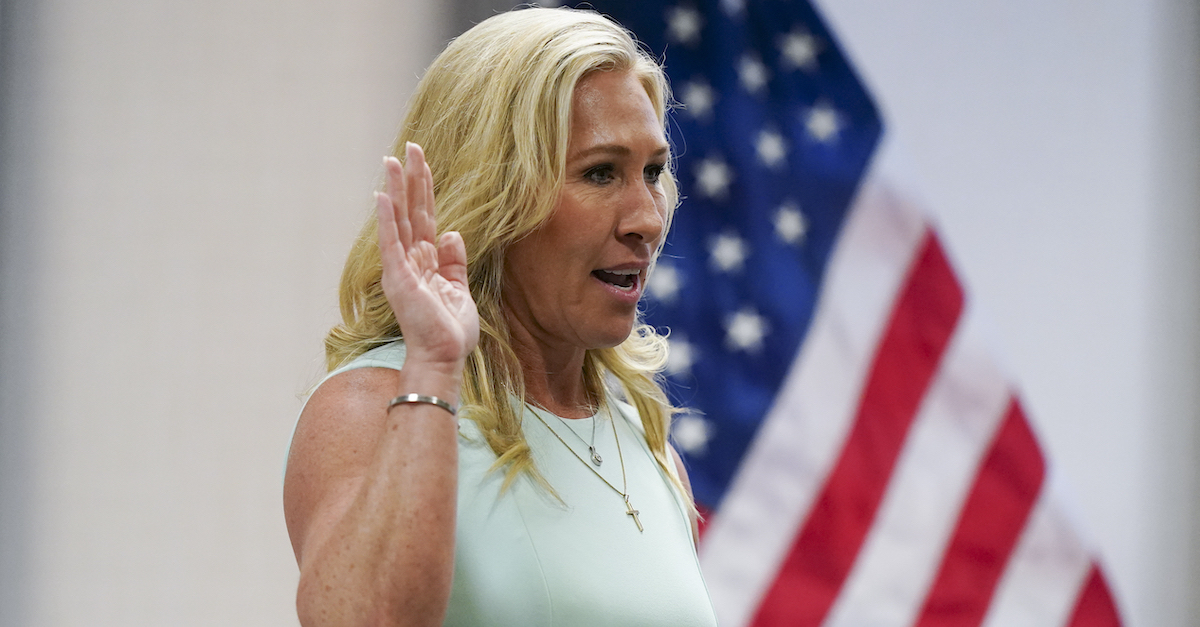
U.S. Rep. Marjorie Taylor Greene prepares to testify on Friday, April 22, 2022, in Atlanta. Greene is appearing at a hearing in a challenge filed by voters who say she shouldn’t be allowed to seek reelection because she helped facilitate the attack on the Capitol that disrupted certification of Joe Biden’s presidential victory. (AP Photo/John Bazemore/Pool.)
As a daylong hearing seeking to disqualify Rep. Marjorie Taylor Greene (R-Ga.) drew to a close, an attorney for her challengers argued that the Donald Trump loyalist said the “quiet part out loud” in an interview where she spoke frankly about opposing the peaceful transfer of power to President Joe Biden.
“You have her own words in context against nothing, not even a real denial,” remarked attorney Andrew Celli, a founding partner of the firm Emery Celli Brinckerhoff Abady Ward & Maazel LLP.
For the better part of the day on Friday, Celli had been trying to persuade an administrative law judge in Atlanta not to allow Greene on the ballot under the 14th Amendment’s prohibitions on elected officials participating or aiding in insurrection. The disqualification clause applies only to officials who have taken the oath of office, and Greene took hers on Jan. 3, 2021, three days before the attack on the U.S. Capitol.
“The evidence is is very clear that, in fact, Marjorie Taylor Greene, justified, assisted, supported and promoted the insurrection in that window,” Celli charged.
During her daylong questioning, Greene recalled little about her posts on her now-shuttered Twitter account and video interviews in the days leading up to Jan. 6. Greene claimed not to remember much about what she said in those days, and she insisted that the quoted lines had been taken out of context. In one of the clips, she declared frankly: “We can’t allow power to transfer peacefully, like Joe Biden wants, because he didn’t win the election.” She spoke of a “1776 moment” and the Declaration of Independence frequently, though she at one point denied knowing that the latter referred to King George as a “tyrant.” (That sworn testimony sharply contrasted with what Greene told viewers of the pro-Trump TV channel Real America’s Voice: “If you think about what our Declaration of Independence says, it says to overthrow tyrants.”) At one point, Greene claimed that she couldn’t remember whether she urged Trump to impose martial law.
Greene also had accused House Speaker Nancy Pelosi (D-Calif.) of a crime punishable by death.
“She’s a traitor to our country,” Greene reportedly wrote in a Facebook post. “She’s guilty of treason. She took an oath to protect the American citizens. She gives aid and comfort to our enemies who illegally invade our land. That’s what treason is.”
As first reported by CNN, Greene’s official account then “liked’ a comment that a “bullet to the head would be quicker.”
In a closing statement, Celli described Greene as an instigator of the riot at the Capitol, and said that while she wasn’t part of the mob that breached the building, she bears responsibility nonetheless.
“Marjorie Taylor Greene comes to this court in this nation and she asks to be a candidate for federal office,” Celli said. “She comes with unclean hands. With her hands, her words, her actions, she was one of several leaders who gathered the kindling, who created the conditions, who made it possible for there to be an explosion of violence at the Capitol on Jan. 6. And then, she dropped the match. Now, she comes into this courtroom and says that she’s surprised and appalled that a fire occurred. Sticks of wood and dry leaves are harmless in and of themselves. In fact, they’re natural. They’re healthy for the environment. Rallies, protestations, objections on the floor: These are all things that are good for the Republic. They are part of our tradition. But when the conditions are dangerous, some people capitalize on those conditions and they add a spark, a flame that causes all of those things to explode into a fire of violence and death.”
Georgians spell out “Disqualify Greene” in front of the Georgia State Capitol in support of the challenge to Marjorie Taylor Greene’s qualification for the ballot under the insurrection Clause Of The 14th Amendment on April 21, 2022 in Atlanta, Georgia. (Photo by Derek White/Getty Images for MoveOn.)
Greene’s attorney James Bopp argued that his client’s alleged assistance to Jan. 6 amounts to little more than protected political speech, which does not reach the high bar for incitement set in the Supreme Court’s precedent of Brandenburg v. Ohio.
“They want to hijack and cancel words like ‘1776,’ the ‘Declaration of Independence,’ ‘Independence Day’ and the American Revolution,” said Bopp, a longtime GOP lawyer who spearheaded the Citizens United litigation. “What about—oh, no—defense of the Second Amendment? If you advocate for defense of the Second Amendment, you’re in favor and in fact are engaging in the violent overthrow of the government of the United States. The implication isn’t right.”
Earlier in the hearing, the court heard Greene’s rallying cry: “We aren’t a people that are going to go quietly into the night,” which a lawyer for her challengers traced to actor Bill Pullman’s soaring speech from the film Independence Day. Celli rolled tape in court on a clip where the fictional U.S. president played by Pullman pronounces that line before repelling an extraterrestrial invasion. Greene gruffly denied taking any inspiration from the blockbuster.
“I don’t view courtrooms and politics as Hollywood, like you do,” Greene told Celli.
Before issuing his findings, Administrative Law Judge Charles R. Beaudrot advised the parties that he will consider their written legal arguments in post-hearing briefings. Beaudrot himself will not determine Greene’s fate, but he will pass on his findings to Georgia Secretary of State Brad Raffensperger (R), who will determine whether Greene is “qualified to seek and hold public office. Raffensperger opposed Trump’s baseless voter fraud claims in the 2020 election.